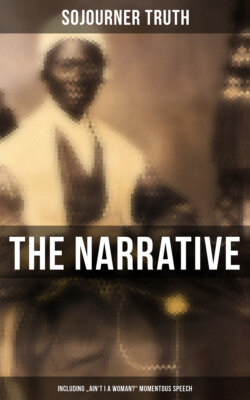Читать книгу The Narrative of Sojourner Truth (Including "Ain't I a Woman?" Momentous Speech) - Sojourner Truth - Страница 12
На сайте Литреса книга снята с продажи.
COMMENCEMENT OF ISABELLA'S TRIALS IN LIFE
ОглавлениеTable of Contents
Having seen the sad end of her parents, so far as it relates to this earthly life, we will return with Isabella to that memorable auction which threatened to separate her father and mother. A slave auction is a terrible affair to its victims, and its incidents and consequences are graven on their hearts as with a pen of burning steel.
At this memorable time, Isabella was struck off, for the sum of one hundred dollars, to one John Nealy, of Ulster County, New York; and she has an impression that in this sale she was connected with a lot of sheep. She was now nine years of age, and her trials in life may be dated from this period. She says, with emphasis, 'Now the war begun. ' She could only talk Dutch-and the Nealys could only talk English. Mr. Nealy could understand Dutch, but Isabel and her mistress could neither of them understand the language of the other-and this, of itself, was a formidable obstacle in the way of a good understanding between them, and for some time was a fruitful source of dissatisfaction to the mistress, and of punishment and suffering to Isabella. She says, 'If they sent me for a frying-pan, not knowing what they meant, perhaps I carried them pot-hooks and trammels. Then, oh! how angry mistress would be with me!' Then she suffered 'terribly-terribly ', with the cold. During the winter her feet were badly frozen, for want of proper covering. They gave her a plenty to eat, and also a plenty of whippings. One Sunday morning, in particular, she was told to go to the barn; on going there, she found her master with a bundle of rods, prepared in the embers, and bound together with cords. When he had tied her hands together before her, he gave her the most cruel whipping she was ever tortured with. He whipped her till the flesh was deeply lacerated, and the blood streamed from her wounds-and the scars remain to the present day, to testify to the fact. 'And now,' she says, 'when I hear 'em tell of whipping women on the bare flesh, it makes my flesh crawl, and my very hair rise on my head! Oh! my God!' she continues, 'what a way is this of treating human beings?' In those hours of her extremity, she did not forget the instructions of her mother, to go to God in all her trials, and every affliction; and she not only remembered, but obeyed: going to him, 'and telling him all-and asking Him if He thought it was right,' and begging him to protect and shield her from her persecutors.
She always asked with an unwavering faith that she should receive just what she pleaded for,-'And now,' she says, 'though it seems curious, I do not remember ever asking for any thing but what I got it. And I always received it as an answer to my prayers. When I got beaten, I never knew it long enough to go beforehand to pray; and I always thought that if I only had had time to pray to God for help, I should have escaped the beating.' She had no idea God had any knowledge of her thoughts, save what she told him; or heard her prayers, unless they were spoken audibly. And consequently, she could not pray unless she had time and opportunity to go by herself, where she could talk to God without being overheard.
